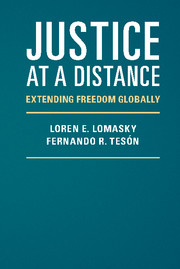3 - Choosing Wealth, Choosing Poverty
Published online by Cambridge University Press: 05 November 2015
Summary
Hundreds of millions of people live in desperate conditions of bare subsistence or worse. Hundreds of millions of others enjoy enormous wealth, enormous at least compared to the lot of their unfortunate brethren. That so many are poor is a terrible misfortune. Does it, however, signify an injustice?
An affirmative answer can take either of two forms. First, the inordinate incidence of poverty in Africa, Asia, and the world's other misery spots can be held to be the result of unjust actions that cause the poverty under which so many labor. Second, though, the disparity between rich and poor can be said to constitute an injustice. That is, the fact of wealthy people retaining possession of nearly all their holdings while refusing to transfer more than a pittance to the less-well-off is itself a failure of justice, specifically a failure of distributive justice.
There are many ways to commit acts of injustice, and several of these will be addressed shortly. However, in the burgeoning literature of global justice, it has become common to focus nearly all attention on distributive justice and its absence. One reason for this emphasis is that in canvassing world populations, the most obvious disparity between countries such as the United States and Sweden, on the one hand, and Burkina Faso and Bangladesh, on the other, is that citizens of the former enjoy so many of the goods that make life go well, whereas those in the latter do without. What is good for us and bad for Burkina Faso is, then, how wealth is distributed. Another rationale for the focus on distributive justice is that when wealthy citizens of Organisation for Economic Co-operation and Development (OECD) countries are called on to take note of the plight of the world's wretched, the one means by which they are told they can make a difference is to redistribute either privately or through political means to the less-well-off. For the fraternity of moral philosophers, however, the single most compelling reason to focus on issues of distributive justice is the towering example of John Rawls. In A Theory of Justice, Rawls argues that justice requires society's basic structure to be organized so as maximally to benefit the least-well-off stratum.
- Type
- Chapter
- Information
- Justice at a DistanceExtending Freedom Globally, pp. 59 - 89Publisher: Cambridge University PressPrint publication year: 2015



